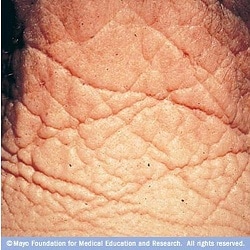I’m pretty sure everyone now realizes at this stage that eating sugar is not healthy. It makes us fat, right? Empty calories and all that. Rots our teeth…we all know this.
Well that’s true but that makes us think that if we want to splurge on sugar then we just cut back on calories elsewhere or work a bit harder in the gym and all will be well. And we all brush and floss so what’s the problem?
Well the fact is, excess sugar consumption is detrimental to our health in many other ways that you may not be so aware of:
Glycation
I’m putting this one near the top to appeal to your vanity. It’s not the biggest but maybe it is a motivator for you. Sugar bonds with protein molecules and impairs functioning causing stickiness in joints. It is particularly drawn to collagen and elastin in the skin. Here’s a picture of glycated skin – pretty isn’t it?!
Depletion of micronutrients (vitamins and minerals)
Here are a couple of specific examples that illustrate how sugar depletes our storage of minerals but know that mineral deficiencies can cause leg cramps, muscle tightness, low blood sugar, diabetes, low blood pressure, PMS, ADD, depression and many more!
- It takes 56 molecules of magnesium to metabolize on molecule of sugar leaving many of us magnesium depleted and a prevalence of high blood pressure, poor sleep, neurological problems and immune issues.
- Calcium stores are drawn on to neutralize the affects of sugar. We see direct links between sugar consumption and osteopenia.
Immune System Repression
White blood cells do not function well in a sugary environment. It depresses our ability to fight viruses, cancer and parasites and especially bacteria. 1 tsp of sugar depresses the immune system for 5 hours. Continued sugar consumption results in immune suppression and opens the door to infections and degenerative disease.
In a battle to gain entry to the cell, sugar wins over vitamin C which most of us know is one of our main immune boosting vitamins.
Feeding Cancer Cells
As adults we do not have many actively growing cells in our bodies except for cancer cells. Cancer cells move through each of us all the time and when we have a high sugar levels they gobble it up for growth. Remove the food for cancer cells and it is going to have a harder time taking a grip.
Insulin Resistance and Type 2 Diabetes
When our system is continually bombarded with excess sugar our cells start to become resistant to the insulin produced to deliver the glucose. The body tries to compensate by producing more insulin in the battle to get circulating blood sugar levels lowered (high blood sugar is toxic). When insulin is raised continually, the body is storing fat and there is weight gain. The consequent high blood sugar is also causing damage to the nervous system, suppressing the immune system and all that we talked about above.
Stress on the system
High blood sugar causes adrenaline production, which puts stress on the adrenals and the entire system. Many of us live in a constant state of stress anyway so our adrenals are already exhausted. When your adrenals are working overtime they may be using up resources needed for other systems like digestion, sex hormones, thyroid hormones etc.
Inflammation
Sugar is one of the main causes of inflammation in the body. We’ve talked about it before so I’ll keep it brief here. Inflammation shows up as diabetes, autoimmune disorders, high blood pressure, and even autism, ADD, ADHD, eczema, asthma—even anger and aggression.
Candida
Candida is a fungal organism that is sometimes known as thrush or a yeast infection. The yeast is always moderately present in your intestinal tract but it can actually loom elsewhere in your body. Candida yeast cells live among the bacterial flora present in the gastrointestinal tract, mucosa, esophagus, small intestine, as well as on the body’s surface. In a balanced healthy state, candida is controlled and mitigated by beneficial bacteria and your immune system. Candida is a sugar-fermenting organism, feeding on blood sugar so it becomes problematic when we eat a high sugar diet. Also it can be a problem if we have a weakened immunity or we possess low levels of beneficial bacteria. Women are typically more susceptible to yeast growth but everyone has a potential to develop a yeast condition.
Does that all motivate you or depress you? It’s a tough one I know! Shifting something in your diet is not easy and particularly with sugar because of its addictive nature and prevalence, not to mention it is wrapped up with so many emotional connections (rewards, treats, celebrations). Most people need help to make lasting change in this area and sometimes it is helpful to check your nutrient levels to have something to really motivate you. We offer support in these areas so please reach out if you need us.


 RSS Feed
RSS Feed
